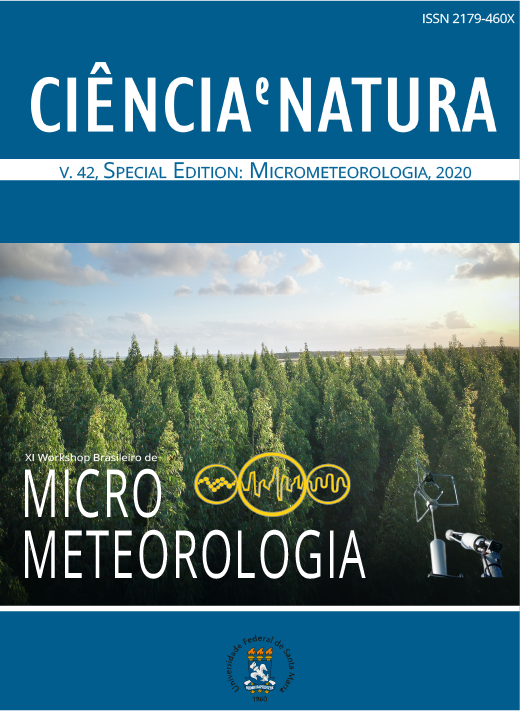Escoamento de drenagem sobre terreno ondulado
DOI:
https://doi.org/10.5902/2179460X45360Palavras-chave:
Escoamento de drenagem, Vento ambiente, Perda RadiativaResumo
O presente trabalho estuda eventos de drenagem de ar frio que ocorrem sobre uma região de terreno ondulado, com diferenças de elevação de algumas dezenas de metros. Para isso, utilizam-se dados coletados durante o outono de 2015 provenientes de uma torre micrometeorológica, e mais quatro estações meteorológicas equipadas com anemômetros sônicos. Os resultados mostram dois casos diferentes de drenagem, um quando o escoamento próximo à superfície se opõe ao vento ambiente, e outro quando o vento ambiente é fraco e apresenta direção de caída do terreno, na qual a drenagem é intensificada.
Downloads
Referências
AMANATIDIS, G. T. et al. Evidence of katabatic flows deduced from a 84 m meteorological tower in Athens, Greece. Boundary-layer meteorology, v. 58, n. 1-2, p. 117-132, 1992.
HORST, T. W.; DORAN, J. C. Nocturnal drainage flow on simple slopes. Boundary-Layer Meteorology, v. 34, n. 3, p. 263-286, 1986.
MAHRT, L. et al. Shallow drainage flows. Boundary-layer meteorology, v. 101, n. 2, p. 243-260, 2001.
PAPADOPOULOS, K. H.; HELMIS, C. G. Evening and morning transition of katabatic flows. Boundary-Layer Meteorology, v. 92, n. 2, p. 195-227, 1999.
SUN, Jielun et al. Transport of carbon dioxide, water vapor, and ozone by turbulence and local circulations. Journal of Geophysical Research: Atmospheres, v. 103, n. D20, p. 25873-25885, 1998.
TOTA, Julio; ROY FITZJARRALD, David; DA SILVA DIAS, Maria AF. Amazon rainforest exchange of carbon and subcanopy air flow: Manaus LBA site—A complex terrain condition. The Scientific World Journal, v. 2012, 2012.
Downloads
Publicado
Como Citar
Edição
Seção
Licença
Para acessar a DECLARAÇÃO DE ORIGINALIDADE E EXCLUSIVIDADE E CESSÃO DE DIREITOS AUTORAIS clique aqui.
Diretrizes Éticas para Publicação de Revistas
A revista Ciência e Natura está empenhada em garantir a ética na publicação e na qualidade dos artigos.
A conformidade com padrões de comportamento ético é, portanto, esperada de todas as partes envolvidas: Autores, Editores e Revisores.
Em particular,
Autores: Os Autores devem apresentar uma discussão objetiva sobre a importância do trabalho de pesquisa, bem como detalhes e referências suficientes para permitir que outros reproduzam as experiências. Declarações fraudulentas ou intencionalmente incorretas constituem comportamento antiético e são inaceitáveis. Artigos de Revisão também devem ser objetivos, abrangentes e relatos precisos do estado da arte. Os Autores devem assegurar que seu trabalho é uma obra totalmente original, e se o trabalho e / ou palavras de outros têm sido utilizadas, isso tem sido devidamente reconhecido. O plágio em todas as suas formas constitui um comportamento publicitário não ético e é inaceitável. Submeter o mesmo manuscrito a mais de um jornal simultaneamente constitui um comportamento publicitário não ético e é inaceitável. Os Autores não devem submeter artigos que descrevam essencialmente a mesma pesquisa a mais de uma revista. O Autor correspondente deve garantir que haja um consenso total de todos os Co-autores na aprovação da versão final do artigo e sua submissão para publicação.
Editores: Os Editores devem avaliar manuscritos exclusivamente com base no seu mérito acadêmico. Um Editor não deve usar informações não publicadas na própria pesquisa do Editor sem o consentimento expresso por escrito do Autor. Os Editores devem tomar medidas de resposta razoável quando tiverem sido apresentadas queixas éticas relativas a um manuscrito submetido ou publicado.
Revisores: Todos os manuscritos recebidos para revisão devem ser tratados como documentos confidenciais. As informações ou ideias privilegiadas obtidas através da análise por pares devem ser mantidas confidenciais e não utilizadas para vantagens pessoais. As revisões devem ser conduzidas objetivamente e as observações devem ser formuladas claramente com argumentos de apoio, de modo que os Autores possam usá-los para melhorar o artigo. Qualquer Revisor selecionado que se sinta desqualificado para rever a pesquisa relatada em um manuscrito ou sabe que sua rápida revisão será impossível deve notificar o Editor e desculpar-se do processo de revisão. Os Revisores não devem considerar manuscritos nos quais tenham conflitos de interesse resultantes de relacionamentos ou conexões competitivas, colaborativas ou outras conexões com qualquer dos autores, empresas ou instituições conectadas aos documentos.






